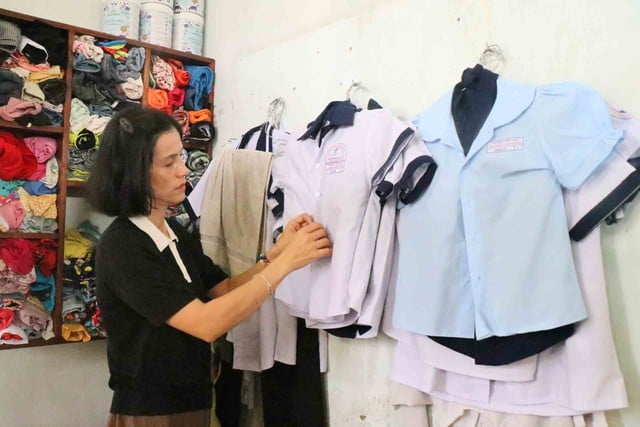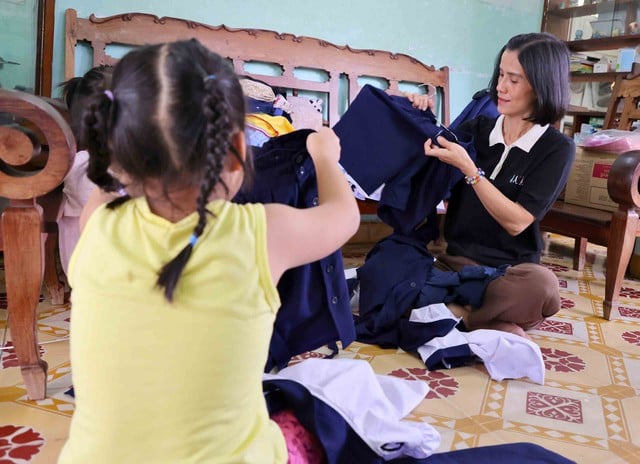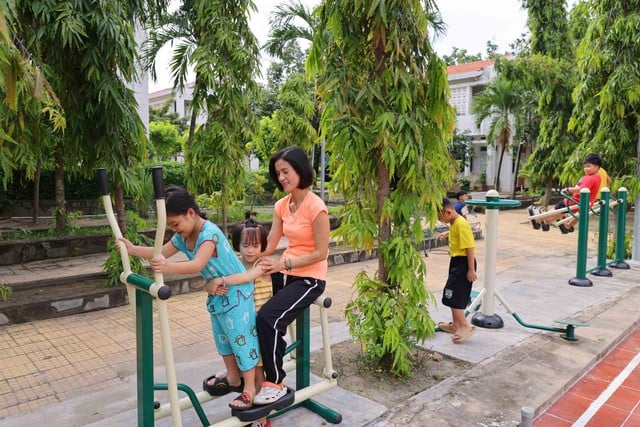"If you have no family, your mother will be your family."
Coming from a medical background and having worked in drug rehabilitation, when she first moved to the Family Home (in 2012), Ms. Trang felt overwhelmed by the number of children there. Initially, she simply thought, "I'll just try to make it to 5 pm and then go home."

Trang's daily work is imbued with the boundless love of a mother.
PHOTO: THUY LIEU
"But the work here usually lasts from morning until the next morning, so I challenged myself to stay overnight with the children. In the evening, the mothers usually put the children under mosquito nets to sleep. When I saw little TA (who has leukemia and is paralyzed on one side of her body) limping to put up her own mosquito net, I felt so sorry for her. I thought, 'How can she have the willpower to put up and neatly tuck in her mosquito net?' At that moment, I wondered, 'Where are her relatives? Why would they leave her here?' Then I told myself, if she doesn't have any relatives, then I'll stay and be her family," Trang recounted the first few months of being a mother to the children.
From then on, Ms. Trang's daily schedule followed the children's routines. At 5:30, she woke the children up, "sorting" the elementary, middle, and high school students to prepare for school, while the preschool group took care of hygiene and breakfast. At 7:00, she received food, went into the kitchen, cleaned, did laundry, etc. By 11:00, she had to finish cooking and preparing meals to welcome the children home from school, bathe them, feed them, and put them to sleep. At 1:00, she woke the children up to prepare for their afternoon classes. On rainy days, Ms. Trang would heat water to bathe each child individually, then dry and tie their hair. At 5:45, the children had dinner, and at 6:30, they sat down to study, a time that Ms. Trang described as "the most stressful day."
When her children are sick, Trang takes them to the doctor, and when they are hospitalized, she stays to care for them. One of her children has asthma, so when the weather turns cold, she sets an alarm for midnight to check on them. During the Covid-19 pandemic, she stayed in the village for seven consecutive months. Trang's family lives in Tan Uyen Ward (Ho Chi Minh City), and her husband is used to her being on long shifts, so he always comes down to visit her whenever he has free time.
Dream of a home
Starting her career with no skills, Trang self-taught herself social work and child psychology. However, her guiding principle remained simple: she had to accept the children.
The Family Ward is a place that welcomes young children with deep emotional wounds. Ms. Trang has had to deal with children who haven't spoken a word for days, or complex cases like LK, a child abandoned by her biological parents, leaving her with a lasting memory.
"K. has lost faith and is deeply hurt. She just says 'yes, yes' to everything I say, but doesn't do it, or does the opposite. I understand that this is how children seek attention, how they defend themselves against insecurities. I have to stay close to them and reward them at the right time. I care for my children in the most natural way possible, just like my mother cared for me when I was little, without preaching or lecturing. Every child has a natural side, as long as adults don't rush to impose a mold," Trang confided.

Ms. Trang is a source of emotional support for traumatized children.
PHOTO: HOANG VAN
And not all children are well-behaved. Some children are so mischievous that the whole neighborhood is at a loss, and they have to be brought to house 12A for Ms. Trang to "rescue" them. After a heart-to-heart talk with her, the child returns to normal. She laughs: "It's probably just fate, the 'destiny' of this profession."
The current model at Thu Duc Youth Village is that children from the age of 4 move to the Family Area. Girls stay there until they graduate from university, while boys move to the Male Management Area at the age of 12. Once, seven boys moved out at once, leaving the house suddenly empty. Ms. Trang was so sad she wanted to quit her job. "I raised them from the age of 3 to 12, never having been a mother, but I loved them like my own children. When they suddenly left, I felt a great sense of loss and hurt. But I tried to stay because the other children still needed a mother," she shared.
Trang's greatest joy is watching her children grow up. She emotionally recounted the story of Thảo, her adopted daughter, who has gone to university, gotten married, and now has children. She and her husband even represented Thảo on her wedding invitation as her biological parents. "When I gave Thảo away, I didn't think about her ever coming back to visit. If she did, that would be my good fortune. Now I've even become a grandmother, and I'm so happy," she smiled.

Ms. Trang hopes her children will grow up to be successful, have jobs, and be able to support themselves.
PHOTO: HOANG VAN
For 13 years, Trang has been deeply concerned about the children's loneliness. She recounts that in the evenings, after the children have gone to bed, she habitually stands at the door of each room, looking at them. "They have blankets and pillows, sleeping together in bed, but they still feel… lonely. Some even told me that when they grow up and get married, they'll only marry someone like their mother, Trang," she recalled, her voice choked with emotion. She understands that she is the only role model of family that many of the children here can relate to.
So every Tet holiday, Ms. Trang asks the Board of Directors of Thu Duc Youth Village to take her children to her mother's house (Tan Uyen Ward, Ho Chi Minh City), which she affectionately calls "going to her maternal grandparents' house to celebrate Tet." The children get to wear traditional ao dai dresses, go to the temple, etc., to experience the atmosphere of a family Tet celebration.
"My dream is to build a house so that when my children grow up, they have a place to come home to. When they're older, working, and have their own families, they can still bring their spouses and children back there to celebrate Tet (Lunar New Year), enjoy a warm meal, and have someone waiting for them. For those who no longer have relatives, it will be a true 'home'," Ms. Trang expressed.
Ms. Thach Ngoc Trang is one of 478 outstanding role models in the patriotic emulation movement of Ho Chi Minh City for the period 2020-2025.
Source: https://thanhnien.vn/tam-long-nguoi-me-185251104183911404.htm



![[Image] A dreamy "livable city" under pink clouds](https://vphoto.vietnam.vn/thumb/1200x675/vietnam/resource/IMAGE/2026/02/24/1771930060937_tp4-jpg.webp)

![[Photo] White pear blossoms bloom across the border of Pho Bang](https://vphoto.vietnam.vn/thumb/1200x675/vietnam/resource/IMAGE/2026/02/24/1771927665653_a8-8280-jpg.webp)


![[Photo] Head of the Central Propaganda and Mass Mobilization Department visits and congratulates the Ministry of Health and the Military Traditional Medicine Institute.](https://vphoto.vietnam.vn/thumb/1200x675/vietnam/resource/IMAGE/2026/02/24/1771938483290_img-2682-3562-jpg.webp)













![[Video] This morning, the National Conference to disseminate Resolutions 79 and 80 of the Politburo took place.](https://vphoto.vietnam.vn/thumb/402x226/vietnam/resource/IMAGE/2026/02/25/1771974191022_dung00-29-45-21still009-png.webp)



























































































Comment (0)